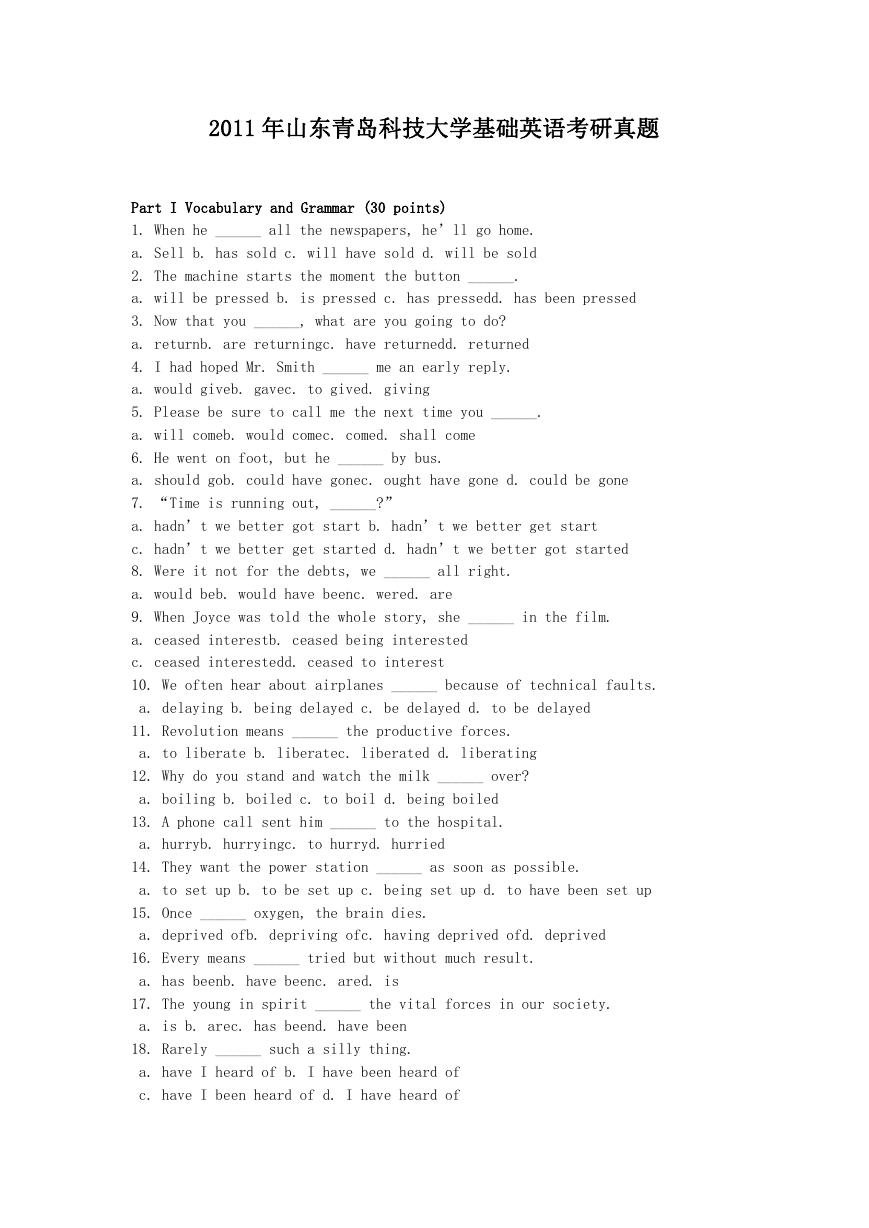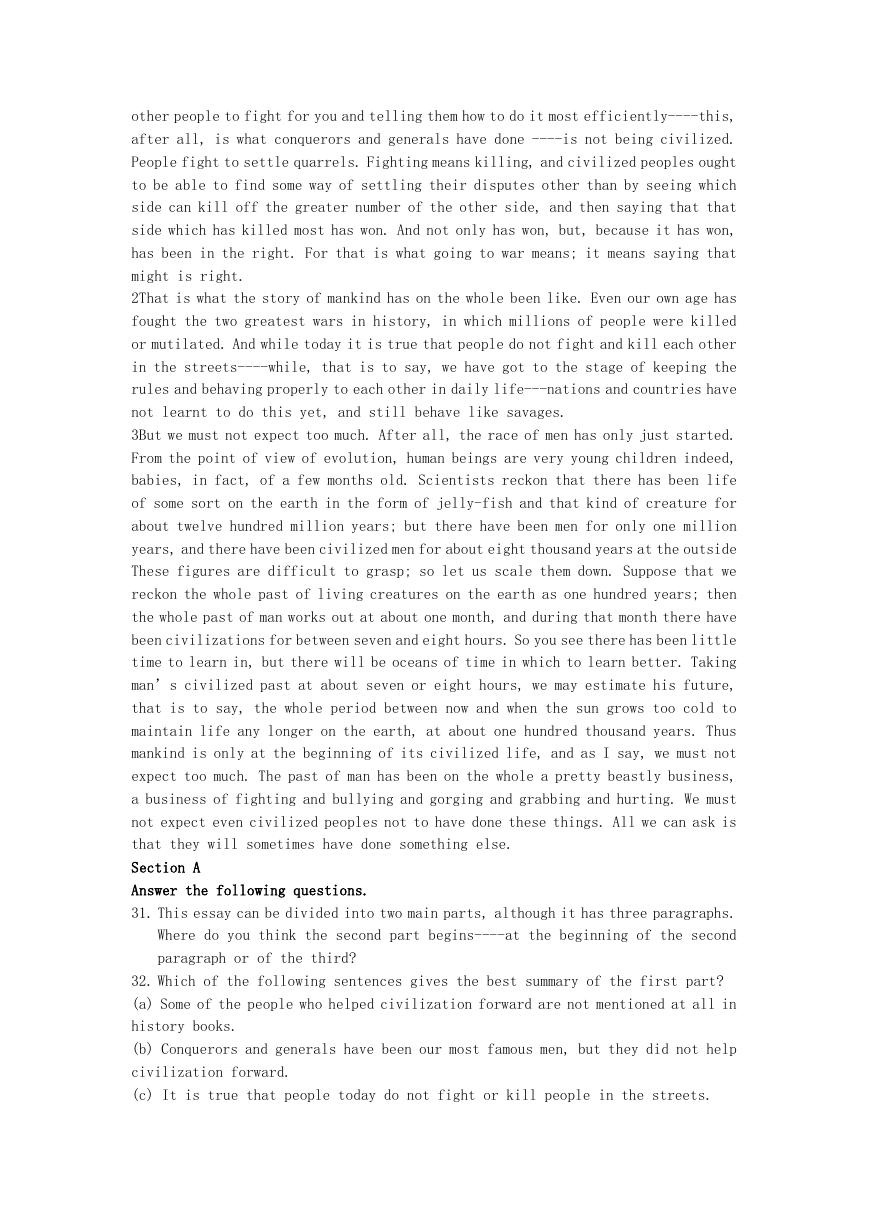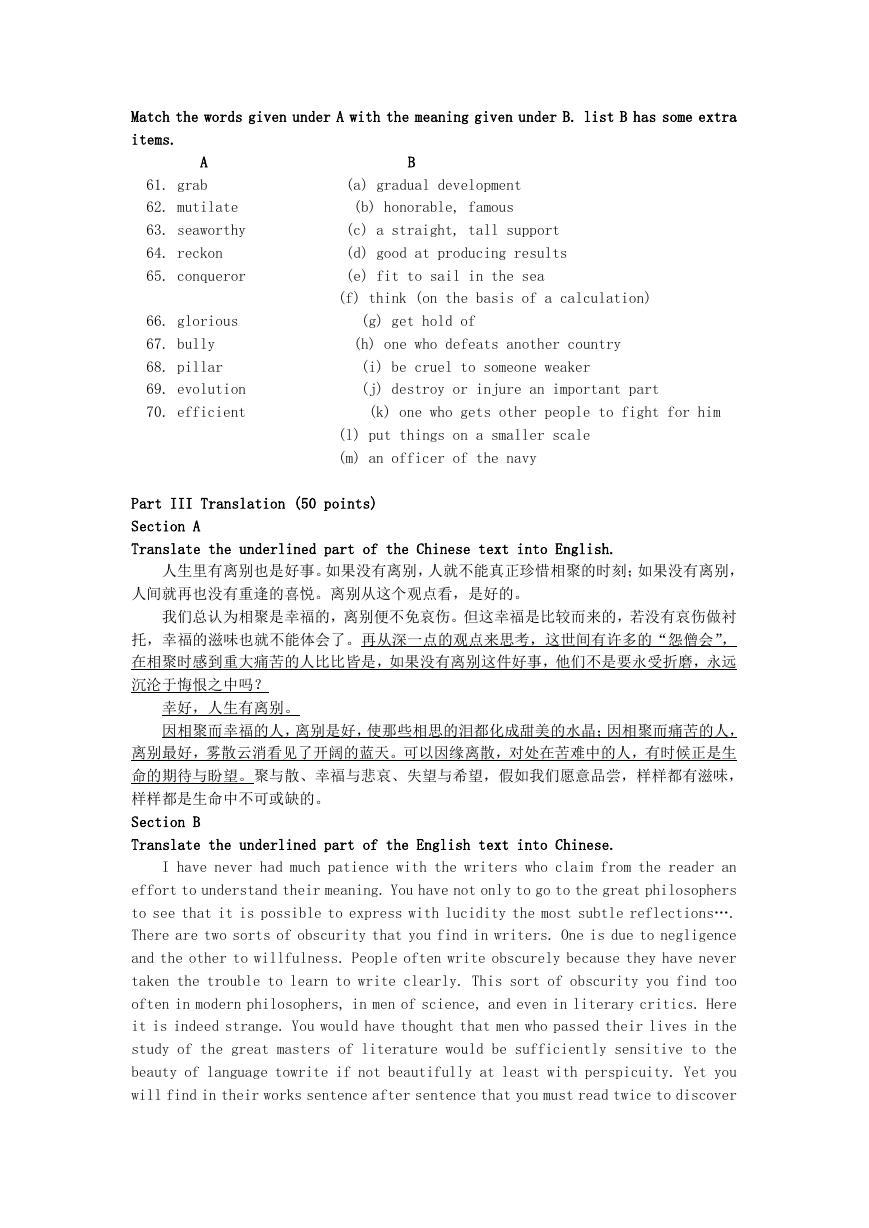2011 年山东青岛科技大学基础英语考研真题
Part I Vocabulary and Grammar (30 points)
1. When he ______ all the newspapers, he’ll go home.
a. Sell b. has sold c. will have sold d. will be sold
2. The machine starts the moment the button ______.
a. will be pressed b. is pressed c. has pressedd. has been pressed
3. Now that you ______, what are you going to do?
a. returnb. are returningc. have returnedd. returned
4. I had hoped Mr. Smith ______ me an early reply.
a. would giveb. gavec. to gived. giving
5. Please be sure to call me the next time you ______.
a. will comeb. would comec. comed. shall come
6. He went on foot, but he ______ by bus.
a. should gob. could have gonec. ought have gone d. could be gone
7. “Time is running out, ______?”
a. hadn’t we better got start b. hadn’t we better get start
c. hadn’t we better get started d. hadn’t we better got started
8. Were it not for the debts, we ______ all right.
a. would beb. would have beenc. wered. are
9. When Joyce was told the whole story, she ______ in the film.
a. ceased interestb. ceased being interested
c. ceased interestedd. ceased to interest
10. We often hear about airplanes ______ because of technical faults.
a. delaying b. being delayed c. be delayed d. to be delayed
11. Revolution means ______ the productive forces.
a. to liberate b. liberatec. liberated d. liberating
12. Why do you stand and watch the milk ______ over?
a. boiling b. boiled c. to boil d. being boiled
13. A phone call sent him ______ to the hospital.
a. hurryb. hurryingc. to hurryd. hurried
14. They want the power station ______ as soon as possible.
a. to set up b. to be set up c. being set up d. to have been set up
15. Once ______ oxygen, the brain dies.
a. deprived ofb. depriving ofc. having deprived ofd. deprived
16. Every means ______ tried but without much result.
a. has beenb. have beenc. ared. is
17. The young in spirit ______ the vital forces in our society.
a. is b. arec. has beend. have been
18. Rarely ______ such a silly thing.
a. have I heard of b. I have been heard of
c. have I been heard of d. I have heard of
�
19. He knows little of mathematics, ______ of chemistry.
A. as well asb. and still lessc. no less than d. and still more
20. Five minutes earlier, ______ we could have caught the last train.
a. orb. but c. and d. so
21. He works too hard. That is ______ is wrong with him.
a. that whichb. that whatc. whatd. the thing that
22. Scarcely was George Washington in his teens ______ his father died.
a. thanb. asc. whiled. when
23. Electricity power is transmitted from power plant to places ______.
a. that it is neededb. to which it is needed
c. where it is neededd. when it is needed
24. That terrible noise is ______ me mad.
a. puttingb. settingc. drivingd. turning
25. All the rooms have ______ carpets, which are included in the price of the house.
a. adaptedb. designedc. equipped d. fitted
26. Is this a good camera? Can it take color ______?
a. portraitsb. filmshowsc. picturesd. Paintings
27. His advice to wear white clothes in a hot, sunny climate was followed.
This ______ helped people to be cooler.
a. demandb. recommendationc. inventiond. request
28. I just have a few household ______ to cope with and then I’ll be free to come
out with you.
a. assignmentsb. chargesc. choresd. errands
29. His breaking of the rules set a dangerous ______.
a. customb. precedentc. practiced. usage
30. They had dug out an ice cave to provide ______ for the night.
a. safety b. refugec. retreatd. shelter
Part II Reading Comprehension (40 points)
Read the article carefully and answer the questions that follow in Section A, B,
C, and D.
CIVILIZATION & HISTORY
1Most of the people who appear most often and most gloriously in the history books
are great conquerors and generals and soldiers, whereas the people who really helped
civilization forward are often never mentioned at all. We do not know who first set
a broken leg, or launched a seaworthy boat, or calculated the length of the year,
or manured a field, but we know all about the killers and destroyers. People think
a great deal of them, so much so that on all the highest pillars in the great cities
of the world you will find the figure of the conqueror or a general or a soldier.
And I think most people believe that the greatest countries are those that have beaten
in battle the greatest number of other countries and ruled over them as conquerors.
It is just possible they are, but they are not the most civilized. Animals fight;
so do savages; hence to be good at fighting is to be good in the way in which an
animal or a savage is good, but it is not to be civilized. Even being good at getting
�
other people to fight for you and telling them how to do it most efficiently----this,
after all, is what conquerors and generals have done ----is not being civilized.
People fight to settle quarrels. Fighting means killing, and civilized peoples ought
to be able to find some way of settling their disputes other than by seeing which
side can kill off the greater number of the other side, and then saying that that
side which has killed most has won. And not only has won, but, because it has won,
has been in the right. For that is what going to war means; it means saying that
might is right.
2That is what the story of mankind has on the whole been like. Even our own age has
fought the two greatest wars in history, in which millions of people were killed
or mutilated. And while today it is true that people do not fight and kill each other
in the streets----while, that is to say, we have got to the stage of keeping the
rules and behaving properly to each other in daily life---nations and countries have
not learnt to do this yet, and still behave like savages.
3But we must not expect too much. After all, the race of men has only just started.
From the point of view of evolution, human beings are very young children indeed,
babies, in fact, of a few months old. Scientists reckon that there has been life
of some sort on the earth in the form of jelly-fish and that kind of creature for
about twelve hundred million years; but there have been men for only one million
years, and there have been civilized men for about eight thousand years at the outside
These figures are difficult to grasp; so let us scale them down. Suppose that we
reckon the whole past of living creatures on the earth as one hundred years; then
the whole past of man works out at about one month, and during that month there have
been civilizations for between seven and eight hours. So you see there has been little
time to learn in, but there will be oceans of time in which to learn better. Taking
man’s civilized past at about seven or eight hours, we may estimate his future,
that is to say, the whole period between now and when the sun grows too cold to
maintain life any longer on the earth, at about one hundred thousand years. Thus
mankind is only at the beginning of its civilized life, and as I say, we must not
expect too much. The past of man has been on the whole a pretty beastly business,
a business of fighting and bullying and gorging and grabbing and hurting. We must
not expect even civilized peoples not to have done these things. All we can ask is
that they will sometimes have done something else.
Section A
Answer the following questions.
31. This essay can be divided into two main parts, although it has three paragraphs.
Where do you think the second part begins----at the beginning of the second
paragraph or of the third?
32. Which of the following sentences gives the best summary of the first part?
(a) Some of the people who helped civilization forward are not mentioned at all in
history books.
(b) Conquerors and generals have been our most famous men, but they did not help
civilization forward.
(c) It is true that people today do not fight or kill people in the streets.
�
33. Which of the following sentences best summarizes the second part of the essay?
(a) In order to understand the long periods of history, we have to scale them down
to shorter periods.
(b) The past of man has been on the whole a pretty beastly business.
(c) Mankind is only at the beginning of civilized life; so we must expect a great
deal of civilization at this stage.
34. What the examples does the author give of people who really helped civilization
forward?
35. In what way are great soldiers similar to animals?
36. Are people today more civilized in any way than in the past? If so, in what way?
37. What were the earliest forms of life on this earth?
38. When will there be no life on this earth, according to the author?
39. The word ‘figure’ is both used in the first paragraph and in the third. Does
it have the same meaning in both places? If not, what are its two different meanings?
40. Is the author hopeful about the figure of civilization? How do you know?
Section B
Answer the questions by choosing the best alternative (a, b, c, d) under each.
41. In the first sentence, the author says that______.
(a) most history books were written by conquerors, general and soldiers.
(b) no one who really helped civilization forward is mentioned in any history books.
(c) history books tell us far more about conquerors and soldiers than about those
who helped civilization forward.
(d) conquerors, generals and soldiers should not be mentioned in history books.
42. On all the highest pillars in the great cities of the world, we find _____.
(a) the figure of the same conqueror or general or soldier.
(b) the figure of some conqueror or general or soldier.
(c) a figure representing the number of conquerors, generals and soldiers in that
country.
(d) the figure of a person who helped civilization forward.
43. Most people believe that the greatest countries are _____.
(a) those that built the highest pillars.
(b) those that were beaten in battle by the greatest number of other countries.
(c) those that were ruled by the greatest number of conquerors.
(d) those that won greatest number of battles against other countries.
44. In the author’s opinion, the countries that ruled a large number of other
countries are _____.
(a) certainly not the greatest in any way.
(b) neither the greatest not the most civilized
(c) possibly the most civilized but not the greatest.
(d) possibly the greatest in some sense but not the most civilized.
45. The author says that civilized people _____.
(a) should not have any quarrels to settle.
(b) should not fight when there are no quarrels to settle.
(c) should settle their quarrels without fighting.
�
(d) should settle their quarrels by seeing which side can kill off the greater number
of the other side.
46. ‘That is what going to war means; it means saying that might is right.’ The
meaning of this sentence is that _____.
(a) those who fight believe that the winner is right and the loser wrong.
(b) only those who are powerful should go to war.
(c) those who are right should fight against those who are wrong.
(d) in a war only those who are powerful will win
47. ‘Even our own age has fought the two greatest wars in history.’ The author
says this in order to show that our own age is _____.
(a) different from those of the past.
(b) not much better than those of the past.
(c) much better than those of the past.
(d) not so civilized as those of the past.
48. ‘From the point of view of evolution, human beings are very young children
indeed.’ The author says this in order to show that _____.
(a) very young children are not civilized.
(b) evolution does not help civilization forward.
(c) human beings have learnt very little in a very long time.
(d) human beings are still at the beginning of their life on this earth.
49. The scale which the author uses for representing time is _____.
(a) one month = one million years.
(b) one hundred years = eight thousand years.
(c) one year = one million years.
(d) one month = twelve hundred million years.
50. ‘We must not expect even civilized peoples not to have done these things.’
This suggests that _____.
(a) those who have done any fighting and bullying cannot be considered civilized.
(b) there is nothing wrong if civilized people do some fighting and bullying.
(c) even civilized people have done some fighting and bullying.
(d) civilized people have never done any fighting and bullying.
Section C
Find single words in this essay which have roughly the meanings given below.
51.uncivilized person
52.fertilized
53.image of a person made from stone, metal etc.
54.quarrel or difference of opinion
55.strength or power
56.all human beings considered together
57.boneless sea-animal which evolved very early on
58.count or estimate
59.as bad as animals in behaviors
60. causing pain
Section D
�
Match the words given under A with the meaning given under B. list B has some extra
items.
A
61. grab
62. mutilate
63. seaworthy
64. reckon
65. conqueror
66. glorious
67. bully
68. pillar
69. evolution
70. efficient
B
(a) gradual development
(b) honorable, famous
(c) a straight, tall support
(d) good at producing results
(e) fit to sail in the sea
(f) think (on the basis of a calculation)
(g) get hold of
(h) one who defeats another country
(i) be cruel to someone weaker
(j) destroy or injure an important part
(k) one who gets other people to fight for him
(l) put things on a smaller scale
(m) an officer of the navy
Part III Translation (50 points)
Section A
Translate the underlined part of the Chinese text into English.
人生里有离别也是好事。如果没有离别,人就不能真正珍惜相聚的时刻;如果没有离别,
人间就再也没有重逢的喜悦。离别从这个观点看,是好的。
我们总认为相聚是幸福的,离别便不免哀伤。但这幸福是比较而来的,若没有哀伤做衬
托,幸福的滋味也就不能体会了。再从深一点的观点来思考,这世间有许多的“怨僧会”,
在相聚时感到重大痛苦的人比比皆是,如果没有离别这件好事,他们不是要永受折磨,永远
沉沦于悔恨之中吗?
幸好,人生有离别。
因相聚而幸福的人,离别是好,使那些相思的泪都化成甜美的水晶;因相聚而痛苦的人,
离别最好,雾散云消看见了开阔的蓝天。可以因缘离散,对处在苦难中的人,有时候正是生
命的期待与盼望。聚与散、幸福与悲哀、失望与希望,假如我们愿意品尝,样样都有滋味,
样样都是生命中不可或缺的。
Section B
Translate the underlined part of the English text into Chinese.
I have never had much patience with the writers who claim from the reader an
effort to understand their meaning. You have not only to go to the great philosophers
to see that it is possible to express with lucidity the most subtle reflections….
There are two sorts of obscurity that you find in writers. One is due to negligence
and the other to willfulness. People often write obscurely because they have never
taken the trouble to learn to write clearly. This sort of obscurity you find too
often in modern philosophers, in men of science, and even in literary critics. Here
it is indeed strange. You would have thought that men who passed their lives in the
study of the great masters of literature would be sufficiently sensitive to the
beauty of language towrite if not beautifully at least with perspicuity. Yet you
will find in their works sentence after sentence that you must read twice to discover
�
the sense. Often you can only guess at it, for the writers have evidently not said
what they intended.
Another cause of obscurity is that the writer is not himself quite sure of his
meaning. He has a vague impression of what he wants to say, but has not, either from
lack of mental power or from laziness, exactly formulated it in his mind and it is
natural enough that he can not find a precise expression for a confused idea. This
is due largely to the fact that many writers think, not before, as they write. The
pen originates the thought. The disadvantage of this-- and indeed it is a danger
against which the author must be always on his guard--is that there is a sort of
magic in the written word. The idea acquires substance by taking on a visible nature,
and then stands in the way of its own clarification.
Part IV Writing (30 points)
Being convenient, fast and inexpensive, e-mails have become more and more popular.
Some people believe that conventional mails will gradually disappear. However, some
people prefer conventional mails to e-mails because they think the former is more
personal, friendly and valuable. Write an essay of approximately 300 words on this
issue to state your own opinions.
�














 2023年江西萍乡中考道德与法治真题及答案.doc
2023年江西萍乡中考道德与法治真题及答案.doc 2012年重庆南川中考生物真题及答案.doc
2012年重庆南川中考生物真题及答案.doc 2013年江西师范大学地理学综合及文艺理论基础考研真题.doc
2013年江西师范大学地理学综合及文艺理论基础考研真题.doc 2020年四川甘孜小升初语文真题及答案I卷.doc
2020年四川甘孜小升初语文真题及答案I卷.doc 2020年注册岩土工程师专业基础考试真题及答案.doc
2020年注册岩土工程师专业基础考试真题及答案.doc 2023-2024学年福建省厦门市九年级上学期数学月考试题及答案.doc
2023-2024学年福建省厦门市九年级上学期数学月考试题及答案.doc 2021-2022学年辽宁省沈阳市大东区九年级上学期语文期末试题及答案.doc
2021-2022学年辽宁省沈阳市大东区九年级上学期语文期末试题及答案.doc 2022-2023学年北京东城区初三第一学期物理期末试卷及答案.doc
2022-2023学年北京东城区初三第一学期物理期末试卷及答案.doc 2018上半年江西教师资格初中地理学科知识与教学能力真题及答案.doc
2018上半年江西教师资格初中地理学科知识与教学能力真题及答案.doc 2012年河北国家公务员申论考试真题及答案-省级.doc
2012年河北国家公务员申论考试真题及答案-省级.doc 2020-2021学年江苏省扬州市江都区邵樊片九年级上学期数学第一次质量检测试题及答案.doc
2020-2021学年江苏省扬州市江都区邵樊片九年级上学期数学第一次质量检测试题及答案.doc 2022下半年黑龙江教师资格证中学综合素质真题及答案.doc
2022下半年黑龙江教师资格证中学综合素质真题及答案.doc